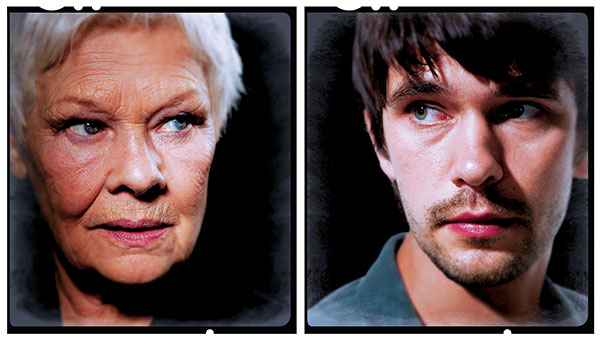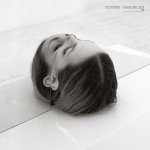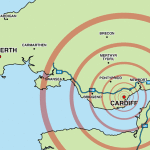Peter and Alice is an original play by John Logan, starring Ben Whishaw and Judi Dench as the two title roles, joined on stage by Olly Alexander as Peter Pan, Ruby Bentall as Alice in Wonderland.
Peter and Alice is an investigation in the dark realm of memories and stories with the heart as a guide. It’s very easy to tell from the start whose hearts we’re talking about, because as the stage welcomes you in (no curtain) a dusty store room yawns with shelves bulging with books. The bookcase on the right suggests hints, with a pirate ship on top and a mirror hanging half way. It’s the one on the right, which means your brain will recognise the objects with its left side first, connecting the feelings they can elicit directly to your own heart.
It’s that fast to be dragged in, as if you were swallowed whole, tumbling down a hole in the ground or flying away. Because Peter and Alice are exactly that Peter and that Alice, the ones you’re thinking of now.
Except it’s their real shadows, the man and woman the literary figures sprouted from, the ones who evoked the characters in the writers’ minds. One is proud to be into a book, the other claims the inspiration actually came from his brother Michael, played by Stefano Braschi.
Just as reality does when compared with fiction by the time they meet it’s clear to them how their lives have made much less sense than their stories, and now it’s too late for the both of them.
Alice Liddell and Peter Llewelyn Davies did meet in 1932, after she’d sold her copy of the manuscript to put up with the cost of maintaining her home after her husband’s death. The bare facts of their lives find their way into the play tiptoeing across the lines, a sentence here and a reference there, from the purple ink that was Carroll’s signature to The Morgue, the collection of family papers and letters Peter Davies had been working on when he died.
But the point is something different altogether.
Because what they really talk about, reluctantly at first on Alice’s side, revolves around two themes: first is the experience that they share, living their lives each with such a prominent shadow it risked smothering the human being underneath.
Then there’s dealing with the unsolicited fame and the not entirely unrequited love the stories came from, with two very different approaches. Either searching relentlessly for a truth that seems to escape any investigation or surrendering gladly to imagination and its fleeting gifts.
Peter Davies is the boy who desperately wants to grow up to finally be sure of something, he wants to become an adult to find the truth about life.
Alice Liddell is the woman who wants to be the blonde girl still, impossibly bold, forever balancing on the verge of her biggest adventure.
Have you ever noticed how difficult it is to remember the way you used to think as a child? Alice Liddell when recreating events of her youth relies on wittiness she didn’t have at the time, because she can’t remember what it was like not to be as she is today. Davies can just think of a smaller version of himself.
These memories take over rather soon, and Peter and Alice literally give up their ghosts, broken as they both are: they are joined on stage by Peter Pan and Alice, by Barrie and Dodgson, played by Derek Riddell and Nicholas Farrell.
Each a reflection, a splinter of interpretation, a remembered past conversation, each mirroring the other, mocking or consoling, their voices mingling in a new dialogue.
One of the turning points of the play is Peter and Alice agreeing on the possibility that something can be true and not real at the same time, thus bestowing the fatal magnitude symbols deserve. Is something less true just because someone imagined it? Is the truth so flexible it’s not real?
At first Wonderland and Neverland don’t seem that far apart. They don’t even seem dangerous, if you don’t consider the Jabberwocky or the Mermaid Lagoon.
The writers are alone, isolated, each with their own palette of suffering, loneliness and fantasies. They feel like echoes.
But danger is true, if not real, because the characters are very much alive. They become the hidden side of Davies and Liddell, blaming and chastising them for those sins they can’t bear to voice on their own, joining in a team, because Peter Pan and Alice in Wonderland end up understanding each other with very little effort.
She is impossible to forget, impossibly bold. He is forgetful and fearless.
It’s funny because at the beginning the audience laughs, especially when Alice Liddell resists Peter Davies with sharp replies (later on Peter Pan resists Alice in Wonderland, only briefly as is his nature). They have no idea what they’re up against.
When Judi Dench cries the entire world heaves a ragged breath and sobs. It’s impossible not to let Alice’s pain reach you and tear at your heart, for anyone you’ve ever lost, those you can’t remember perfectly any longer because so much time has gone by.
When Ben Whishaw cries and begs the universe to have him young again and away we go the world is stabbed and bleeds to death.
Is growing up naming your fears? Is it inevitably linked with pain?
If that’s the case Alice offers Peter a way out. It’s made of laudanum, and golden afternoons far behind you can do nothing but remember. It’s a hand stretched over a dark gorge, the dark gorge of the ugly truth, the place called Adulthood, where boys don’t fly, mermaids don’t exist and cheshire cats don’t go because they can’t endure the pain. Imagination can be true, if not real, Alice would say, and it’s beautiful. If it’s not real it’s a lie, Peter would say, imagination is a glittering trap.
It’s your life, now choose.
When you walk out the loot you’re carrying is a heavy one. It’s made up of inescapable human experience, of considerations on life and death and the intertwining of the two. And as you walk home you might feel Hook’s cold touch, whispering your worst fears to life. Should it happen remember what Alice tells Peter, “stories can’t hurt you”, and check if your shadow is still in its proper place. If it is you’ve escaped imagination for another day, whether you like it or not.
Peter and Alice is on at the Noel Coward Theatre till the 1st of June 2013. Tickets 10£-57£
http://www.michaelgrandagecompany.com




